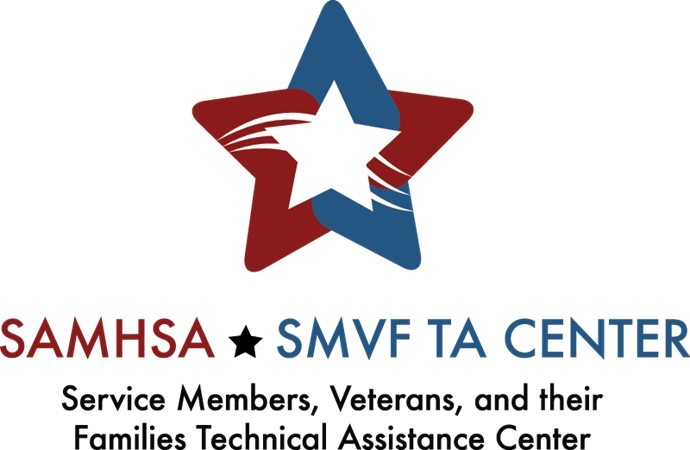
- This event has passed.
SAMHSA’s Service Members, Veterans, and their Families Technical Assistance Center Presents: Best Practices and Systems of Support for Justice-Involved Veterans
January 27, 2021 @ 12:30 pm - 2:00 pm

The designation justice-involved Veteran is used to describe former service members who are involved in the criminal justice system. Involvement in the criminal justice system can range from initial arrest to court involvement, incarceration in jail or prison, or reentry into society. The high rates of mental illness, post-traumatic stress disorder (PTSD), substance use disorders (SUDs), and traumatic brain injury (TBI) have adversely affected more than half of justice-involved Veterans. A number of emerging best practices, programs, and standards of care have been developed to address the unique challenges faced by justice-involved Veterans. Diversion and reentry interventions have expanded access to legal services and housing, enhanced jail-diversion strategies through Veteran’s treatment courts and cultural competency training to first responders and provided reentry transition supports utilizing Veteran peer mentors. Additionally, supportive rehabilitation approaches have included specialized housing programs within jails and prisons, increasing connectedness among justice-involved Veterans.
This webinar will provide an overview of emerging best practices and systems of support for justice-involved Veterans from the “front end” or initial point of contact with first responders to the point of reentry and readjustment with support from systems, programs, and peers. A presentation from Sean Clark, national director of Veterans Justice Programs within the U.S. Department of Veterans Affairs (VA), will discuss the comprehensive and preventative approach and initiatives of both the Veteran’s Justice Outreach program serving Veterans interfacing at the first intercept of the criminal justice system and programs targeting reentry into communities after long-term incarceration. Gregory Crawford, correctional program specialist at the National Institute of Corrections (NIC) within the U.S. Department of Justice (DOJ), will provide a unique insight into the national reforms and collaborative efforts underway within DOJ. These efforts include the Veterans Compendium Project, amplifying the work of Veterans Treatment Courts, piloting national curricula and Veterans risk needs assessment tools, and leveraging the agency’s role to bridge gaps between agencies and organizations. A presentation from Ray Lay, board member of the National Alliance on Mental Illness Indiana Board of Directors and the Indiana Balance of State Continuum of Care Board of Directors and a volunteer Veteran peer support specialist with the Mental Health Intensive Case Management Team at Roudebush Veterans Affairs Medical Center, will provide an up-close look at his own experience with the criminal justice system, illustrate the risk factors and protective factors critical to preventing recidivism, and highlight some of his success stories working as a Veteran peer mentor within the Indiana prison system.
Click on the following link to register prior to the event:
https://thenationalcouncil-org.zoom.us/webinar/register/WN_eg1mSZVVQ6KFVUQVEe8nmg
Presenters
Cicely K. Burrows-McElwain, LCSW-C, Military and Veterans Affairs Liaison, Office of Intergovernmental and External Affairs, Office of the Assistant Secretary, Substance Abuse and Mental Health Services Administration
Sean Clark, J.D., National Director, Veterans Justice Programs, U.S. Department of Veterans Affairs
Gregory R. Crawford, Correctional Program Specialist, National Institute of Corrections, U.S. Department of Justice
Ray Lay, Board of Directors, NAMI Indiana; Board of Directors, Indiana Balance of State Continuum of Care; Veteran Peer Support Specialist, Mental Health Intensive Case Management Team, Roudebush Veterans Affairs Medical Center; Chief Executive Officer, SMI Enterprises, LLC
Learning Objectives:
- Identify how mental health, substance use, and military service intersect with the criminal justice system
- Provide an overview of the current environmental factors surrounding justice-involved Veterans
- Take a trauma-informed approach to understanding the needs of justice-involved Veterans
- Explore the role of VA and its partnership with the Justice-Involved Veterans Network in identifying innovative best practices to assist justice-involved Veterans
Target Audience
Peer mentors, systems administrators, court administrators, peer support specialists, behavioral health specialists, SMVF, and justice system officials.
After registering, you will receive a confirmation email containing information about joining the webinar.
Please note:
- Participants will only be able to hear the webinar through their computer via headphones or speakers
- Participants are asked to test their system before the broadcast
- The webinar archive will be made available to registrants after the webinar
- Continuing education units are not available for this webinar
If you have any questions about your registration, please contact Philip Paty at (518) 439-7415, ext. 5272, or by email at ppaty@prainc.com.